According to Malcolm Farr, when the Finkel review appeared, this is what Malcolm Turnbull said about the Clean Energy Target:
- “Well it would certainly work, there is no question it would work and we are looking at it, giving it very favourable consideration.”
Rafael Epstein interviewing Josh Frydenberg on RN Drive replayed Turnbull’s audio, saying also the CET had “strong virtues”.
Now, according to the AFR Goverment walks away from Alan Finkel’s CET.
- The Clean Energy Target as proposed by Chief Scientist Alan Finkel will be overhauled and replaced with a policy that will place much greater emphasis on coal-fired baseload power and possibly a slower transition to renewable energy.
At the same time, energy regulators and industry sources suggested there was no need to prolong the life of the Liddell Power Station in NSW and that energy shortfall created by its closure in 2022 could be met by other means.
From James Massola at the SMH we now get this:
- In comments that were widely noted by Coalition MPs, the Prime Minister said Dr Finkel’s recommendation for a clean energy target was “under consideration” but that “we need to make sure that we get the energy market right this time”.
“We need to ensure that the energy market design provides a suitable framework for investment that doesn’t simply get new generation, but gets generation of the right kind,” he said.
The emphasis is now on “cheap” and “reliable” power.
Turnbull really wants to put some space between his position and that of Labor so that he can call Labor the party of blackouts and high electricity prices. As I said in the Liddell post, bipartisanship must be avoided at all costs.
There is talk about the influence of Abbott and five MPs who might cross the floor (Dennis Atkins in the CM says 5 to 10), but in truth the way to sensible policy is blocked by this man:
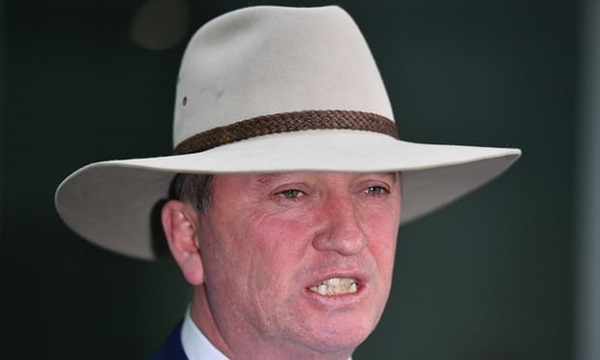
In the Guardian, Barnaby Joyce says any new energy investment mechanism must include coal power. In spades, if you hear him talk. Journalists have been told that the words “clean” and “renewables” will not appear in any rebadging of the Clean Energy Target, the 50th recommendation of the Finkel review, and the only one not implemented.
The Government says there is no rush, the CET was to replace the RET after 2020. They’ll make up their minds by Christmas. However, they are demanding that AGL cough up a concrete proposal within 90 days on how they might replace Liddell’s capacity in 2022, absent of any knowledge on what the governments policy framework might be. I think it likely that the Government will look for a way of rejecting whatever AGL put forward.
It’s fair to say Turnbull has detonated his credibility with the business energy community, and investors (bankers, fund managers and such). In the AFR we have an “investor”, probably a fund manager, suggesting that AGL go offshore rather than make new investments here.
Giles Parkinson asks the question Could Turnbull succeed where Abbott failed, and kill large scale wind and solar?, a must-read.
He points out that gas and coal-fired power stations are not reliable, especially old clunkers like Liddell:
- It lost more than half of its capacity in last summer’s heatwave, just as the two biggest gas plants in the state also tripped, victims of heat-related problems.
However, the most significant failure was north of the border in Queensland, with the release of an Australian Energy Regulator report on peaking prices, where all and sundry, including Giles Parkinson, has accused Queensland government power companies of gaming the system. The report:
- focuses on the failures of coal and gas generators in the heat, this time in Queensland on February 12, when five different “baseload” coal and gas generators shed a total of 790MW of capacity owing to heat-related technical issues and just as the state’s temperatures soared and demand hit record highs. And Queensland’s is a relatively young fleet.
You might recall I reported at the time that we had rolling blackouts in a number of suburbs in South East Queensland. At our place in Ashgrove the lights stayed on, I suspect because we have a fire station nearby. My brother and his son monitored the whole thing on their smart phones. There was nothing in the media about it, and no mention on the ABC next morning, no record on the AEMO or Energex sites.
In SEQ when the lights are back on it’s no longer news. It should have been. The blackouts were bigger than in SA, but there were no renewables to blame.
The AER report is here.
Also Audrey Zibelman, CEO of AEMO, has clarified the advice they gave to the Turnbull government on dispatchable capability in a piece AEMO: Our advice was pretty straight forward, we need dispatchability.
She wasn’t talking about baseload, she was talking about fast, flexible dispatchability that could be relied on if a baseload plant fails in heat:
- Zibelman made it absolutely clear that her preference was for fast, flexible technologies, both in supply and demand, and bother in front and behind the meter. Importantly, it had to be technology that the market operator could rely upon.
“The system is changing,” Zibelman said. “That’s not a bad thing. What we need to do is to start saying we have to think about next the generation of technologies, the next generation of markets and how to take advantage of it.”
Further:
- “In our report we identified the fact that with amount of variability (from solar and wind energy and electricity usage) is changing rapidly, we need resources that can change rapidly.
“That may be different to traditional baseload resources, which do not move a lot. It doesn’t mean baseload is bad, it’s just that we need a different portfolio. (Baseload) may not be able respond in the time period we need it to respond.”
Frydenberg says that the AEMO advice “reset the debate”. It did, but not quite in the way he claims. In the AFR we have AEMO plans for a grid with or without Liddell:
- The Australian Energy Market Operator has to plan for a power grid with or without AGL Energy’s Liddell coal fired power plant in NSW, AEMO chief executive Audrey Zibelman said.
Ms Zibelman said Australia can set much more ambitious demand response or demand management targets than the US – as much as 30 per cent to 40 per cent of total system capacity – because of our high levels of wind and solar penetration.
She said this could help balance demand and supply in the electricity market, because managing “behind the meter” distributed energy resources such as solar panels, batteries and smart air conditioners and lighting systems “can be just as effective as turning on a generator”.
Zibelman said:
- it would be up to AGL “and others” whether Liddell closed in 2022 – the company’s date – and AEMO’s job was to make sure “we have the ability to operate a reliable system if it does retire”.
So:
making sure the system could cope with Liddell’s closure in 2022 involved determining the level of “dispatchable” or flexible, firm power that the system needs.
It then required looking at whether existing plant can be made more flexible to help meet this need while new technologies such as batteries and pumped hydro storage evolve.
The third requirement is for price signals to bring forward dispatchable capacity and these could include a day ahead market, payments for reliable power dispatch, a generator reliability obligation or demand response markets.
Zibelman said there was confusion and misunderstanding about demand management which she helped set up in 2005 when she ran the grid for PJM, a giant northeastern US utility. In one week in 2006 demand management saved customers $US800 million they would otherwise have paid for electricity. She thinks the potential here is greater than it was in the US.
Brian Toohey thinks that having Ms Zibelman as CEO at AEMO renders redundant Finkel’s recommendation, accepted by the Turnbull government, that an Energy Security Board be set up with its main mission keeping the lights on.
Zibelman works for the COAG Energy Council, seen here at ‘work’:
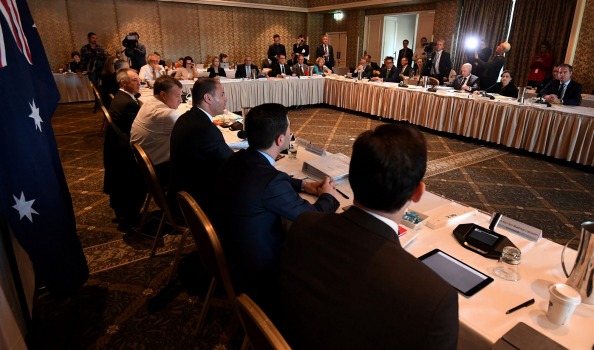
The Energy Security Board is a chair, a deputy chair and the heads of the three National Electricity Market entities. This photo includes the key players:
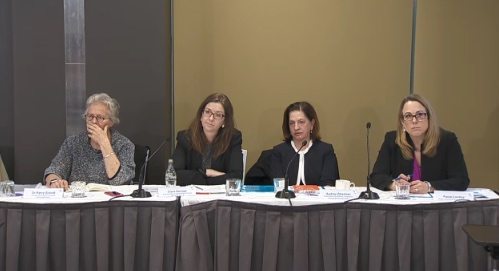
To me it looks about the ideal size for strategising, solving problems and doing stuff. It had its first meeting the other day.
Dr Kerry Schott AO came via Sydney Water and Transgrid where she was chair. Before that she has been NSW Commissioner of Audit, senior NSW Treasury official, CEO of Sydney Water, Managing Director of a global investment bank and Oxford academic. Clare Savage came from the Business Council.
Schott told The World Today that there was no crisis, that the sale of Liddell is best left with AGL, and when pressed, she said the CET was a matter for government, but she said that there was “a very clear understanding” in the sector that a CET is needed.
In another segment, Audrey Zibelman told a parliamentary committee essentially that the matter was in hand.
So why do Turnbull and Frydenberg think they need to interfere?
The only logical answer is that it is about power, but political power rather than electrical power.
I’ll finish with this message from the Pope, mined from Giles Parkinson’s piece Turnbull’s energy obstructionism is Abbott’s climate denial revisited:
-
“Those who deny it (climate change) should go to the scientists and ask them. They are very clear, very precise,” the pontiff said Monday during a press conference on the return leg of a five-day Colombia trip.
“A phrase from the Old Testament comes to mind: ‘man is stupid, a stubborn, blind man’,” he added.
“These aren’t opinions pulled out of thin air. They are very clear,” he said.
“They (world leaders) decide and history will judge those decisions,” he added.
Stupid? Not Malcolm. He’s usually the smartest bloke in the room. So why is he giving in to those who are?
BTW why did Turnbull find it necessary to blast the Opposition for being “quick to rush to the aid of multimillionaire American chief executives of giant electricity companies”?
It’s OK to be a multimillionaire if you are a PM, but not the CEO of a large company, where it is part of the package? Or are American multimillionaires offensive if they run Australian companies? I give up, but here’s Rowe:
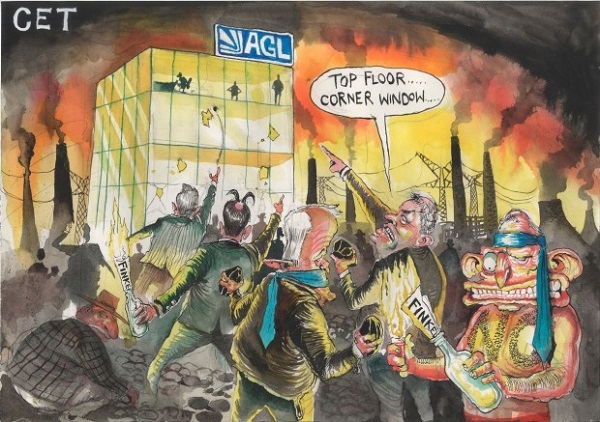

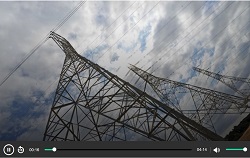
Given the complete lack of energy consensus at the moment it is a bit hard to see how a CET target will boost investor confidence. Particularly so given what Abbott did to the carbon tax and Howard’s RET scheme.
The way things are going at the moment progress is going to be driven by individuals and companies deciding to invest and state governments and territories using renewable auctions and direct investment to get on with things despite the energy crazies in the federal government.
It is also worth asking what bank would be crazy enough to lend to a company that wanted to build a coal fired power station. It would be like lending money to Adani.
But it’s OK to rush to the aid of billionaire Indian chief executives such as Gautam Adani?
Pot, meet Kettle.
John, I think this mob know that no bank will come to the party, so the only way is to use public money. I don’t know how crazy the NSW government is, but Tim Nichols (LNP opposition leader in Qld, for those who don’t know) has promised to initiate a new coal-fired station in North Queensland within 100 days of taking office. No doubt he’ll be looking at the federal Northern Development honey pot.
Other than that Turnbull and company are sacrificing investor confidence for political ends.
New Climate clippings now up, with a collection of renewable projects going ahead pretty much ignoring Turnbull and Frydenberg.
Malcolm Farr this morning on the question where the Government is up to with energy on the Friday political panel on RN Breakfast (at 6:36)
LNP has now got away with two major technological fails which will send our country back for decades, the NBN and energy. Why?
Malcolm Turnbull says he’s governed by engineering rather than ideology.
He lies.
But for him personally it’s about being the chair of a meeting of fools. He just cahirs the meeting. No leadership.
It’s the price of wanting to be PM, and now choosing the best political path of those available to him to stay there.
That’s the only way I can figure it.
Heh BHP gets it
Brynn O’Brien, the director of the Australian Centre for Corporate Responsibility
With AGL and other major energy industry operator open deviance with the Coal-ition and now BHP, how long can the coalition hold together, surely something has to give?